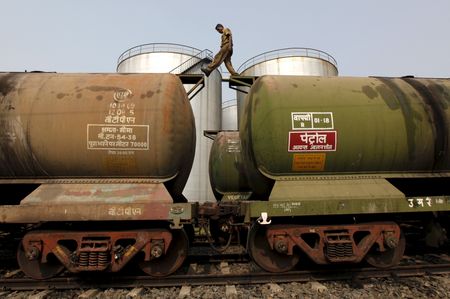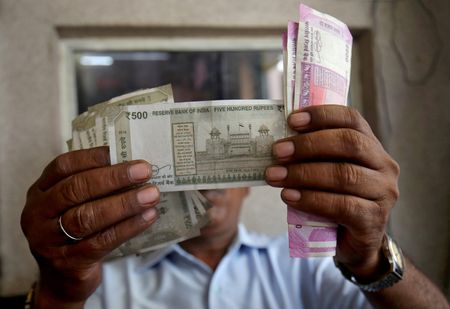By Nidhi Verma
NEW DELHI (Reuters) -Indian refiners are poised to sharply curtail imports of Russian oil to comply with new U.S. sanctions on two top Russian producers, industry sources said on Thursday, potentially removing a major hurdle to a trade deal with the United States.
The change comes as India faces punishing 50% tariffs on its exports to the U.S. – with half of those duties in retaliation for Russian oil purchases – and negotiates a potential trade deal that could bring those tariffs in line with Asian peers in exchange for winding down crude imports from Moscow.
India has emerged as the biggest buyer of discounted seaborne Russian crude in the aftermath of Moscow’s 2022 full-scale invasion of Ukraine, importing about 1.7 million barrels per day in the first nine months of this year.
Privately-owned Reliance Industries, the top Indian buyer of Russian crude, plans to reduce or halt completely its import of Russian oil, according to two sources familiar with the matter.
“Recalibration of Russian oil imports is ongoing and Reliance will be fully aligned to GOI (Government of India) guidelines,” a Reliance spokesman said in response to a query on whether the company plans to cut its crude imports from Russia.
Indian state refiners including Indian Oil Corp, Bharat Petroleum Corp and Hindustan Petroleum Corp are also reviewing their Russian oil trade documents to ensure no supply will be coming directly from Rosneft and Lukoil after the U.S. sanctioned the oil companies, a source with direct knowledge of the matter said on Thursday.
India’s oil ministry and the state refiners did not immediately respond to requests for comment.
“There will be a massive cut. We don’t anticipate it will go to zero immediately as there will be some barrels coming into market” via intermediaries, a refinery source said, declining to be named as they were not authorised to speak with media.
‘IT ALL DEPENDS ON BANKS’
U.S. President Donald Trump on Wednesday imposed Ukraine-related sanctions on Russia for the first time in his second term, targeting Lukoil and Rosneft as his frustration grows with Russian President Vladimir Putin.
“If the Trump administration does indeed back today’s words by action, we anticipate that refiners seeking to retain access to U.S. capital markets will forego Russian barrels,” RBC Capital analyst Helima Croft wrote in a note.
The U.S. Treasury has given companies until November 21 to wind down their transactions with the Russian oil producers, according to a release on the sanctions on Wednesday.
“It all depends on banks,” another Indian refinery official said. “If banks clear payments then we will buy. Otherwise my intake will be zero.”
BIG BUYER
Reliance, which is controlled by billionaire Mukesh Ambani and operates the world’s biggest refining complex at Jamnagar in western Gujarat state, has a long-term deal to buy nearly 500,000 bpd of crude oil from Russian oil major Rosneft. The refiner also buys Russian oil from intermediaries.
In recent days, Reliance has purchased spot crude cargoes from the Middle East and Brazil, which could be used to partly replace Russian supplies, traders said. It was seen in the market on Thursday scouting for supplies, said a Middle Eastern trader approached by Reliance.
One of the sources said that before the U.S. move, Reliance was considering stopping Russian oil imports for the one of its two refineries that is export-focused due to a ban by the European Union on refined products produced from Russian oil that takes effect in January.
Indian refiner Nayara Energy, whose biggest shareholder is Rosneft, also buys oil from the Russian state company. Nayara did not immediately respond to a request for comment.
Indian state refiners rarely buy Russian oil directly from Rosneft and Lukoil as their purchases are typically made through intermediaries, trade sources said.
Brent crude futures extended gains, rising more than 3% on Thursday.
(Reporting by Nidhi Verma; Writing by Florence Tan and Tony Munroe; Editing by Himani Sarkar, Tom Hogue and Kate Mayberry)











